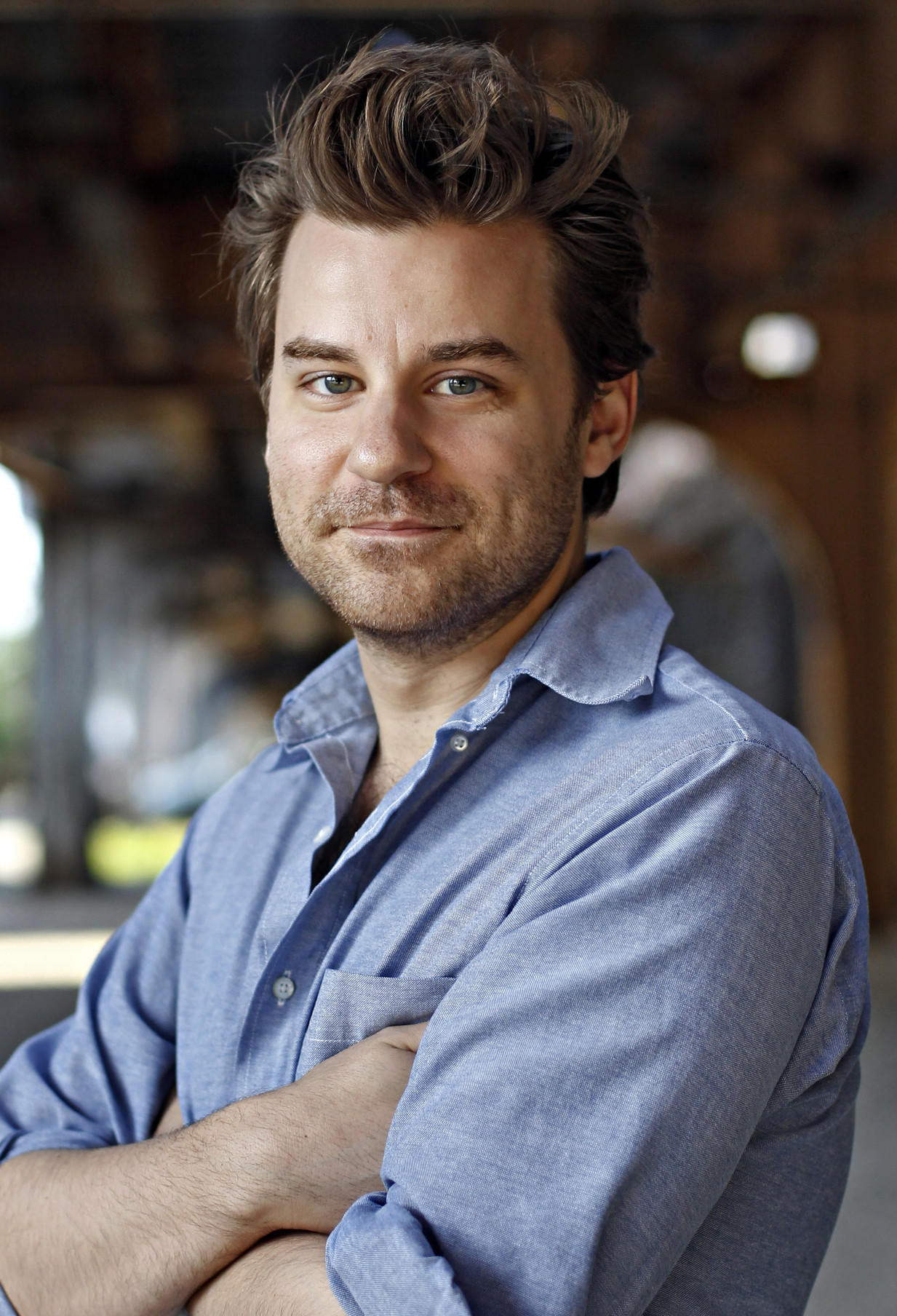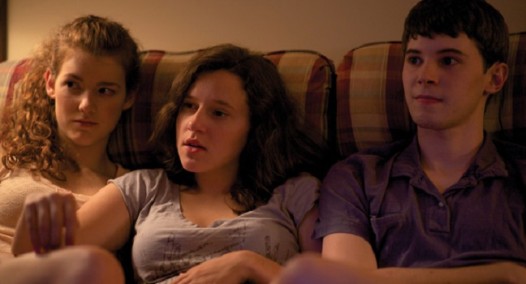Talking About Passion and the Films of Stephen Cone
 Friday, November 3, 2017 at 10:00PM
Friday, November 3, 2017 at 10:00PM by Glenn Dunks
 In some ways, Stephen Cone is an unlikely name to warrant a retrospective. And yet in other ways, he’s a perfect choice. Those who already know this writer-director likely typify him, not incorrectly, by the way he infuses queer-leaning narratives with themes of religion and faith. But considering Cone’s films – of which he is likely best known for Henry Gamble’s Birthday Party from 2015 – have rarely ventured out of the queer film festival circuit and his earlier works remain virtually unseen, Talk About the Passion: Stephen Cone’s First Act is actually a well-timed way to learn about a filmmaker who is clearly doing enough right to stick around for a little while yet.
In some ways, Stephen Cone is an unlikely name to warrant a retrospective. And yet in other ways, he’s a perfect choice. Those who already know this writer-director likely typify him, not incorrectly, by the way he infuses queer-leaning narratives with themes of religion and faith. But considering Cone’s films – of which he is likely best known for Henry Gamble’s Birthday Party from 2015 – have rarely ventured out of the queer film festival circuit and his earlier works remain virtually unseen, Talk About the Passion: Stephen Cone’s First Act is actually a well-timed way to learn about a filmmaker who is clearly doing enough right to stick around for a little while yet.
His debut as a feature direct after several short and medium-length titles was In Memoriam, a film that sits rather out of place among Cone’s filmography. Following a man who becomes curiously obsessed with the story of a couple who fell from their roof while drunk and who decides to make his own movie about their love, it plays very much like a low-budget stereotypical first film full of artistic flourishes and awkward narrative beats. It’s not a bad film, but it is also hard to decipher exactly what it was that Cone was attempting to say beyond a very basic reading that everybody’s story deserves to be taken seriously.

He followed that one quite quickly with The Wise Kids, released in the same year. This was the first time his own life as the son of a Baptist minister came into play on a feature (many of his shorts dealt with religious themes) and mixed with what I assume is his experiences of growing up gay (correct me if I am wrong). While it is certainly not averse to some of the same directorial greenness that he showed in In Memoriam, The Wise Kids proves a significant step up...
It works predominantly because Cone doesn’t treat his characters of faith with contempt – something that is far too common in LGTBQ films where they are often played for cartoon laughs (and that includes Latter Days, of which I am not a fan).
What Cone gets right here is the sense of community within the church. I grew up with many religious friends despite not being religious myself. And despite being an outsider who didn't quite understand what it was all about (my family was not religious and I was agnostic from an early age), I found much within that realm that Cone authentically recreates. I like the way he was able to represent the way teenage friends who are religious are all part of a connected family, where one’s house is everyone’s house and the way summer nights play out in parallel to the more typical high school experience that we are shown in film and television.
The teenagers here have an reality to them where they are often exaggerated in their reactions, concerned with being labelled stupid, being naturally inquisitive without wanting to show that to the world, and in the case of the Tyler Ross’ Tim, just being one first kiss away from freely admitting who they are. I liked that it didn't veer into typical tragedy as one could easily expect from a story blending these two worlds.

The themes of The Wise Kids merge perfectly with Henry Gamble’s Birthday Party, arguably Cone’s most well-known film. Set on a single day at a birthday party for a young teenage boy, it explores not so much his coming out to his peers as his realization to not only what’s obvious to himself, but to everyone else. The religious themes here are subtler, but again that sense of faith-based community is strong and Cone does well in navigating how changes in societal norms around sexuality and mental health are also changing those with strong religious cores.
Before Henry Gamble, however, was an odd double. It’s best to ignore This Afternoon, a rather horrendous 60-minute excursion into latter day mumblecore noodling from 2014 about a seminary student accidentally walking into a sex addicts anonymous class that never proves a good fit for Cone’s particular skills. At best it has a frankness about sex that is appealing, while at its worst it’s borderline offensive towards Nikki Taguilas-Pierce’s character.

But the surprise of the five-film series for me is definitely Black Box, Cone’s most formally adventurous film as a writer and even as a director despite the majority of the runtime taking place in a single location. Largely ditching the religious themes on an up-front textual level (although they are there weaved throughout if you pay attention), Black Box follows the efforts of a university student directing a play based on a childhood favourite book about a torturous and cruel foster home. More about the creation of art than what people may typically expect from Cone, it’s curiously the film in his catalogue that feels the most cinematic. His rhythms and tones and subtleties are just stronger here than they are elsewhere, and I found myself involved with the drama in a way that, even in the films of his that I like, I hadn’t quite experienced before. There was structural and formal intrigue as well as character. I hope he goes down that path again.
Which brings us to Princess Cyd. These concepts explored in Black Box of the creative process return one again here in the story of a teenage girl who is shipped off to live with her aunt, a famous author who Cyd discovers is more religious than she otherwise assumed (as many young people who grow up in non-religious households will find), and begins to explore her bisexuality.

These two elements, faith and sexuality, yet again play a strong part here, but they are quieter here than they have been before. The two lead performances, Jessie Pinnick as Cyd and Rebecca Spence as Miranda (not Amy Brenneman as I initially suspected!), really sell the organic way these two influence one another. Spence is particularly wonderful, her natural charm an essential part of what makes her Aunt Miranda such a warm character. And a believable one, too, as a small-town religious woman whose openness about her niece’s burgeoning sexuality with the androgynous Katie (Malic White) feels – and here’s that word again – authentic of a part of America that filmmakers often don’t give enough credit to. And I equally appreciated Cone’s treatment of bisexuality, a letter in the queer acronym that is often either outright ignored or weirdly delegitimized in both life and in culture.
Princess Cyd is out now at MoMI in NYC and in Chicago with L.A. to follow and hopefully other cities, too. Talk About the Passion: Stephen Cone’s First Act plays MoMI from November 3 – 12



Reader Comments (2)
retrospectives should be more common for undersung under-radar filmmakers who have something like a body of work already. I've only seen Henry Gamble's Birthday Party but it felt so distinct that I'm eager to see other films from him. Guess I'm off to Princess Cyd soon!
Thanks so much for covering this. Wise Kids and Henry Gamble are both great, especially Gamble, and this makes me want to check out Black Box, something I've been meaning to do.
But I have one quibble: "small-town religious woman"? She lives in Chicago. And not a suburb, but in the city proper. She lives in the house she grew up in. I know it doesn't look like the typical Chicago of movies (which always means downtown, for some reason), but trust me, this was the city. Even the beach scene at the end was still in the city.